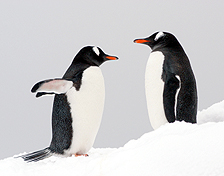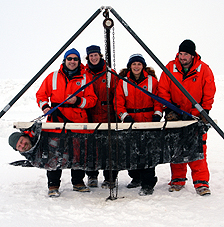|
March 10, 2003
Biologist Daniel Costa to describe scientific
voyages to Antarctica
Public talk at the Seymour Center is on March
12
By Tim Stephens
As chief scientist aboard the research vessel Laurence
M. Gould,
Daniel Costa led a research team investigating the ecology
of the Southern
Ocean around Antarctica on two cruises in 2001 and 2002.
|

|
Antarctic wildlife includes Gentoo
penguins, above, the fastest swimmers of all birds. Below, Daniel
Costa tries out the sling researchers used to weigh seals during
the expedition to Antarctica.
Photos: Daniel Costa |
 |
Costa, a professor of ecology and evolutionary biology, will share
his experiences conducting research during the harsh
Antarctic winter,
along with breathtaking photos he took along the way, in a
public lecture
and slide show at Long Marine Laboratory.
The lecture will take place at the Seymour Marine Discovery Center,
100 Shaffer Road, Santa Cruz, on Wednesday, March 12, from 7 to 8:30
p.m. Admission is $6 for the general public and $4 for members of the
Friends of Long Marine Lab. For more information, call (831) 459-3800.
The biologically productive waters off Antarctica support trillions
of shrimplike crustaceans called krill that play a central
role in the
ecology of the Southern Ocean.
Animals that feed on krill include commercially important fish, seals,
whales, penguins, and other seabirds. How the krill and their predators
survive the long, cold polar winter is one of the questions the researchers
on the Laurence M. Gould set out to answer.
The cruises were part of the Southern Ocean component of the Global
Ocean Ecosystems Dynamics survey (SO GLOBEC), which is part of a wider
international GLOBEC program funded in the United States by the National
Science Foundation.
The program was set up to study how marine life is
affected by environmental
change. Costa serves on the executive committee of the SO
GLOBEC program,
in addition to his role as chief scientist on the two cruises.
Because so many top predators concentrate on krill as their primary
food source, scientists have been concerned about the vulnerability
of the Southern Ocean ecosystem to environmental perturbations, such
as climate change, Costa said.
"One of our main goals is to understand the role of climate in
driving the ecosystem of the Southern Ocean," he said.
"We'd
like to know, for example, what factors determine the number of krill
that survive the winter."
The program's field studies involved two research vessels,
the Laurence
M. Gould and the Nathaniel B. Palmer. As chief scientist
of the Laurence M. Gould, Costa was responsible for
coordinating
the work of a diverse group of researchers, while conducting his own
research on crabeater seals.
Despite their name, crabeater seals eat mainly the shrimplike krill.
They have evolved elaborately shaped interlocking teeth that they use
to filter krill from the water. Although they are probably the most
numerous seals in the world, crabeater seals have been difficult to
study because of their remote habitat.
To follow the movements of crabeater seals and study their feeding
behavior, Costa used electronic tags that transmitted signals to the
researchers via satellite. Satellite tags were also used to study the
movements of Adélie penguins.
Other researchers on the cruise focused on whales, krill, the algae
that live in sea ice, and various aspects of the physical
environment.
An unexpected finding from the 2001 field studies was the occurrence
of "hot spots," areas of abundant Antarctic krill
where predators
such as minke whales, humpback whales, seals, and penguins were also
found in large numbers.
Conducting field studies in the Antarctic winter was hard work, but
the researchers also found time to have fun, Costa said. In his talk
at the Seymour Center, Costa will try to convey a sense of what life
was like on the cruises, while presenting some of the
scientific findings
to come out of the SO GLOBEC program.
Return to
Front Page
|